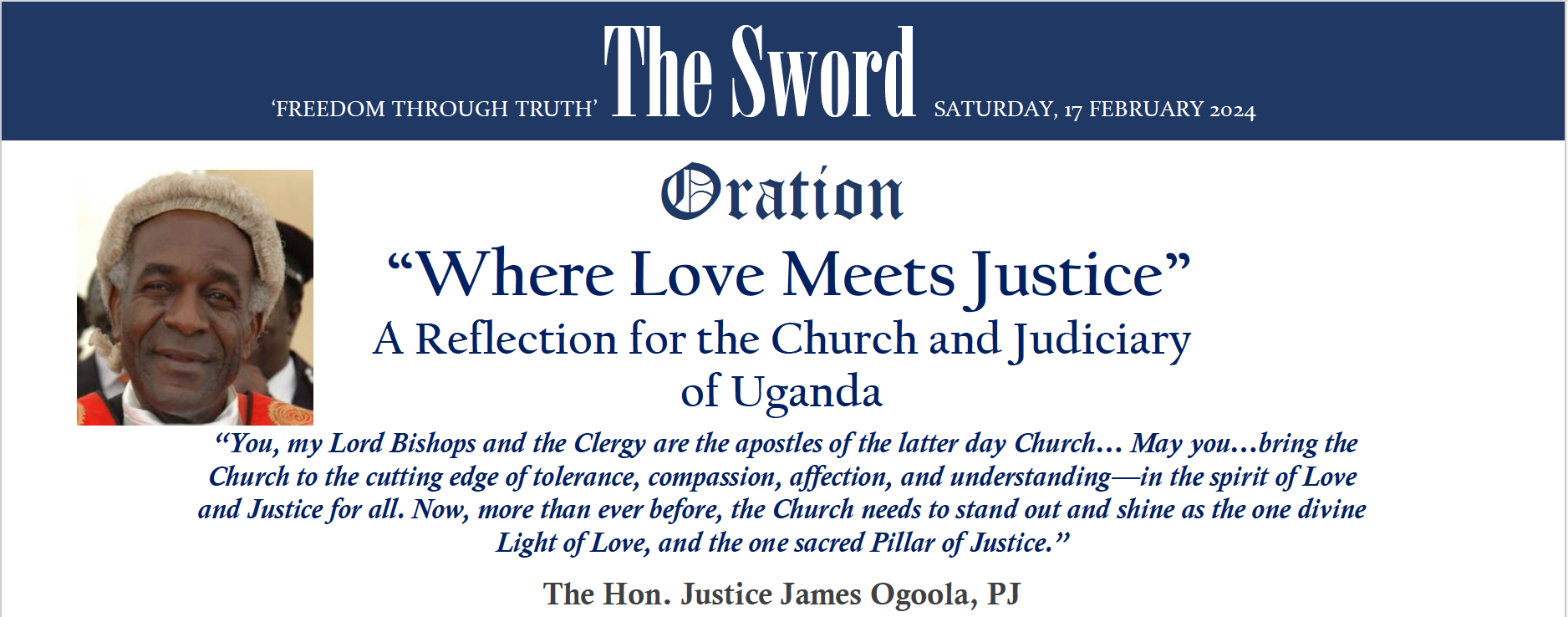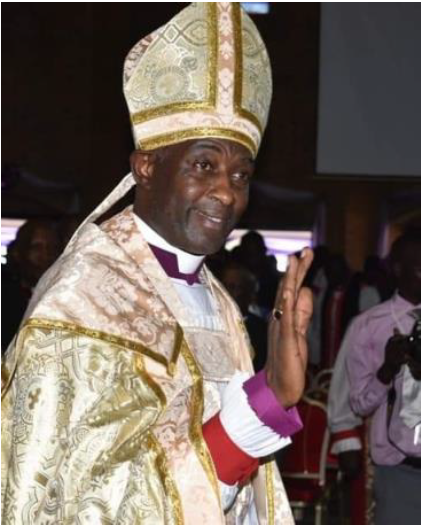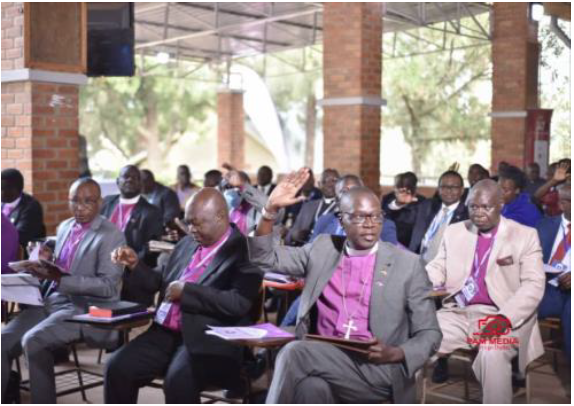
YOUR Grace, the Archbishop; My Lord Bishops; Venerables, Prophets, Priests & Clergy; All Distinguished Guests; Fellow workers in the Vineyard: I greet you fervently in the One Blessed Name, which is above all other names!
I thank His Grace the Archbishop of the Church [of] the Province of Uganda, The Rt. Rev. [sic] Henry Luke Orombi, for having graciously invited me to give the Key Note Address at this Kacoke Madit of the Lord’s faithful in Uganda. This great Gathering reminds me of the very first Gathering of the First Century Church in Jerusalem, where Apostles (led by Peter and James); Evangelists (notably Paul and Barnabas); and the fresh Followers of Christ, met as a Council of the initial Church, to discuss the burning issue of what to do with the Gentile Believers. Should they subject the Gentile to the rigorous law of the Jew; and strict doctrine of the Torah; or should they threaten the Gentile convert with “kid” gloves of the love gospel of Christ?
Although the Jerusalem gathering was led by Apostle Peter and Apostle James—and even though I am myself a namesake of “James”—I am certainly not an Apostle. A Disciple? Yes. An evangelist? Probably—in the mold of Barnabas, perhaps. You, my Lord Bishops, and the Clergy are the apostles of the latter-day Church, assembled here in the August Gathering to resolve burning issues in the Church. A number of these issues are so seismic that they threaten to rend the Church apart: I speak here of the scourge of sodomy that still rears its dreaded head, ever since Gomorrah. I speak also of the abomination of abortion that ails our society today, even in the midst of the tremendous scientific knowledge and social know-how that is freely available to all in this modern age! May you the Peters and Jameses, and the Pauls and Barnabases here assemble, be anointed of Him: the Most High; and may your deliberations bring the Church to the cutting edge of tolerance, compassion, affection, and understanding—in the spirit of Love and Justice for all. Now, more than ever before, the Church needs to stand out and shine as the one divine Light of Love, and the one sacred Pillar of Justice.


This brings me to the theme of my topic this morning: Where Love Meets Justice. Where does the godly Bishop meet the secular Judge? What is the common ground at which the love that is suffused in our faith, meets the justice that is saturated in our legal ethos? When does the sacred teaching of the Church connect with the secular reality of an oppressed populace? These, my Lords, are some of the burning issues of our Church in our time. These are the issues that will define the Church of the future and the law of tomorrow.
Let me start from the beginning. At the dawn of time when only the Spirit of the Lord roamed the vault, God made man and quickly added woman. In his mirror image made He, purposing to mold their inner being with love, morality, virtue, goodness, and godliness. That was the very essence of man and woman! But at the same time, He gave them rules and regulations to guide them, and precepts and punishments to correct them: Thou shalt not eat of the fruit at the centre of knowledge. If you do, you will surely die! That was the distillate of justice. And so, right from the beginning, here at the cradle of creation, we come face to face with Love and Justice intermingled!
We now move fast forward from Genesis to Eden, to the Exodus of Egypt. We meet Moses: Speaker of the Parliament of Mount Sinai and Chief Justice of the Court of Israel. First, God hands Moses the stone tablets, gravely engraved with the tense Ten Commandments. These are the cornerstone for the governance of God’s people. These Ten Commandments are inviolable, incomparable, indestructible, and immutable. Though of ancient vintage, they are still as good today as they were then. They have become the standard template, from which all secular laws are derived; and the firm foundation stone on which the laws of the nations are constructed. They featured in Hammurabi’s laws, they found a basis for the magnificent Napoleonic Code of Laws. They took pride in England’s venerable Magna Carta. They were embedded in the American
Declaration of Independence and the consequent Constitution of the United States. And recently, as late as only last week, here in our own backyard to the east, the Ten Commandments have formed the tenets of Kenya’s brand new Constitution. That, my Lord Bishops, is the proud legacy of Moses the Lawgiver par excellence, who, like the Apothecary of old, dispensed God’s very own love and compassion for the welfare of his beloved people—manifested in the indomitable Ten Commandments.
But secondly, Moses was more than just a Lawgiver. He also became the judge, sitting upon the judicial cathedra judging his people. He became so diligent and so engrossed in the chores of Court Chambers that his own father-in-law, Jethro, became extremely perturbed and concerned about his health and well-being. Ultimately, Jethro was moved to advise Moses, in no uncertain terms, to decentralize the Judiciary: to appoint junior magistrates and lesser judges to judge the lesser, more inconsequential cases, so that Moses would himself concentrate on the more critical and more complex disputes arising between the people and the Community. Here, again, we see the hand of the Lord at work, forging the ground for efficient, effective, and accessible justice for all; and sharpening the point at which love meets justice.
Later, in Israel’s history, a long catalog of leaders emerged by God’s grace, to rule the nation. They were, for lack of a better title, called Judges: 14 of them in all. They ruled Israel, or parts thereof, for a very long time: between the death of Joshua and the institution of the monarchy. Most of these Judges were military heroes: Samson (the Nazarite) for one—he of Philistine fame, who was consecrated from the womb to deliver Israel virtually single-handedly. Bare-handedly, without any weapons (save the jawbone of an ass), he rescued Israel from 40 years of Philistine captivity, oppression, and suppression. Others of the Judges, were more prophetic and priestly, such as Eli and Samuel, the priests. And yet others, combined both elements, such as Deborah, the prophetess and war heroine. But in either case (military or priestly), during the period of the Judges, the Lord was experimenting with how his divine love for his specially chosen nation could embrace the reign of reason and the rule of justice. Whenever, in the days of the Judges, the two elements of love and justice coincided in the harmony of fidelity to God, Israel blossomed and bloomed in peace and prosperity. But whenever the two were discordant in rebellion to God’s law, Israel was relegated to deprivation and devastation—invariably abducted, captured, and dragged away into far-off pagan lands, to drink the bitter cup of misery and slavery.
Finally, there arrived on the scene, Solomon the Wise: the Patron Saint of all Judges, whose independence, integrity, impartiality, and resourcefulness as a fair Judge, is as legendary as is his fabulous wealth and opulent splendor. The incomparable quality of justice, meted out by the sharp blade of Solomon’s sword, was equal only to the immutable love and compassion that he exhibited for the wronged, the grieving, and the cheated mother.
The lesson in all this is that we, as modern nations, need to reflect deeply on the question: Where does love meet justice? When does love meet justice? How does love meet justice? And, by whom (or through whom) does love meet justice? The primary answer, evidently, is: The meeting point of those two virtues is in the Fear of the Lord—a function for which you the Bishops, and us the Judges, are uniquely equipped to lead the people. My call, to us all, is simple. It is simple but scriptural. It is biblical: “Come, let us reason together!”—as indeed, we have come to do at the great Kacoke Madit (the Provincial Assembly) of the Church of Uganda.

On the face of it, the training of Bishops is drastically different from the training of Judges. The calling of one is different from the calling of the other. And, the duty and function of the one in society, seems on the surface to be different from that of the other. Yet, in truth both the Priest and the Judge meet at a fundamentally critical point: in the dispensation of love and the delivery of justice to God’s people. Approaching from two different directions (the sacred and the secular); and brandishing two different books of armour (the Holy Bible and Sovereign Statute Book), the Priest and the Judge meet their client at the point of his most critical need: hope and faith in the efficacy of the system. The Church and the Court must ascend the mountain top, hold high the flag, and stay at the forefront of the effort to dispense love and justice to the desperate and the disenchanted; to the oppressed and the suppressed; to the heartbroken and the downtrodden; to the repulsed and the despised; and to the dispossessed and the destitute. That is the reason why Bishops were created and consecrated. That is the reason why Judges were appointed and anointed. The one descended from Aaron. The other is derived from Moses. Needless to say, the two Patriarchs were brothers formed in the same womb, chiseled and woven in the rigorous fabric of the harsh desert [during the] Exodus; and consecrated into the same ministry: to dispense, love, and offer justice in equal measure to God’s Chosen. And so, today we address Aaron, the Bishop as: “My Lord”; just as we address Moses, the Judge as: “My Lord”. This is where the ecclesiastical (authority) meets the secular (command)—the two kinds enwrapped like twins in a common bond of brotherhood, to advance the cause of the spiritual and the temporal welfare of God’s own Children.
Bishops, and all you children of God; we may pause here and pose a difficult question. Scripture says: “Give to God what is God’s; and to Caesar, what is Caesar’s.” Where, then, does compassion and the welfare of the needy fall? In whose jurisdiction does social responsibility fall: God’s or Caesar’s? However, the same scripture also says: Attend to the sick; visit the prisoner; Clothe the naked; Feed the hungry; and Support the needy. It is for this that the despised but compassionate Samaritan was picked out of the exclusive club of the righteous Priest and upright Levite to be crowned with the coveted title of “the Good Neighbour”! The compassion of the Good Samaritan, is the very embodiment of the Law and the Prophets—whose authoritative summary is this: Love the Lord your God with your all; and your neighbour as yourself! In short, the area of compassion is the borderless common ground where God meets Caesar; where Love meets Justice: the Love of the Lord, which passes all understanding—love to the extreme; love sacrificial: even to the extent of the mortal cross.
As I close, let us reflect on that thought. The Passion and the Cross stand for blood and water flowing out of the body of Christ. In truth, they represent love and justice intermingled, stretched out on the cross, flowing out in all the directions of the compass: North, South, East, and West; embracing the whole breadth and length of humanity, as symbolized by the sign of the long and broad cross, pointing in each and every direction of the globe.
Here at Calvary, Love and Justice meet; and Church and State bow in awesome wonder!
This keynote address (the sub-title is the Editor’s design) was given on 19 August 2010 at the opening of the Provincial Assembly of the Church of Uganda hosted by the Uganda Christian University at Mukono.
At the time, Justice Ogoola was the Principal Judge of Uganda and Lord Justice of the COMESA Court of Justice. He has since been installed Canon in the Church of Uganda and also retired from the Ugandan Bench.
The Sword is, presently, an online digital periodical promoting highbrow reflections on decolonization, decolonial thought, and social justice, based in Kampala, Uganda.
To support The Sword, please contact us via Twitter/X (@thesword_08) or send us an email via theswordug@gmail.com.

